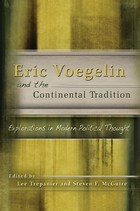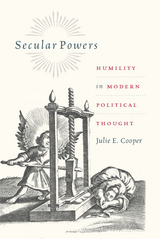2 books about Modern Political Thought

Eric Voegelin and the Continental Tradition
Explorations in Modern Political Thought
Edited by Lee Trepanier & Steven F. McGuire
University of Missouri Press, 2011
Twentieth-century political philosopher Eric Voegelin is best known as a severe critic of modernity. Much of his work argues that modernity is a Gnostic revolt against the fundamental structure of reality. For Voegelin, “Gnosticism” is the belief that human beings can transform the nature of reality through secret knowledge and social action, and he considered it the crux of the crisis of modernity. As Voegelin struggled with this crisis throughout his career, he never wavered in his judgment that philosophers of the modern continental tradition were complicit in the Gnostic revolt of modernity.
But while Voegelin’s analysis of those philosophers is at times scathing, his work also bears marks of their influence, and Voegelin has much more in common with the theorists of the modern continental tradition than is usually recognized. Eric Voegelin and the Continental Tradition: Explorations in Modern Political Thought evaluates this political philosopher—one of the most original and influential thinkers of our time—by examining his relationship to the modern continental tradition in philosophy, from Kant to Derrida.
In a compelling introduction, editors Lee Trepanier and Steven F. McGuire present a review of the trajectories of Voegelin’s thought and outline what often is portrayed as his derisive critique of modernity. Soon, however, they begin to unravel the similarities between Voegelin’s thought and the work of other thinkers in the continental tradition. The subsequent chapters explore these possible connections by examining Voegelin’s intellectual relationship to individual thinkers, including Hegel, Schelling, Kierkegaard, Heidegger, and Gadamer.
The essays in this volume go beyond Voegelin’s own reading of the modern philosophers to offer a reevaluation of his relationship to those thinkers. In Eric Voegelin and the Continental Tradition, Voegelin’s attempt to grapple with the crisis of modernity becomes clearer, and his contribution to the modern continental tradition is illuminated. The book features the work of both established and emerging Voegelin scholars, and the essays were chosen to present thoughtful and balanced assessments of both Voegelin’s thought and the ideas of the other thinkers considered. As the first volume to examine the relationship—and surprising commonalities—between Voegelin’s philosophy and the continental tradition as a whole, this text will be of interest not only to Voegelin disciples but to philosophers engaged by continental modernism and all disciplines of political philosophy.
[more]

Secular Powers
Humility in Modern Political Thought
Julie E. Cooper
University of Chicago Press, 2013
Secularism is usually thought to contain the project of self-deification, in which humans attack God’s authority in order to take his place, freed from all constraints. Julie E. Cooper overturns this conception through an incisive analysis of the early modern justifications for secular politics. While she agrees that secularism is a means of empowerment, she argues that we have misunderstood the sources of secular empowerment and the kinds of strength to which it aspires.
Contemporary understandings of secularism, Cooper contends, have been shaped by a limited understanding of it as a shift from vulnerability to power. But the works of the foundational thinkers of secularism tell a different story. Analyzing the writings of Hobbes, Spinoza, and Rousseau at the moment of secularity’s inception, she shows that all three understood that acknowledging one’s limitations was a condition of successful self-rule. And while all three invited humans to collectively build and sustain a political world, their invitations did not amount to self-deification. Cooper establishes that secular politics as originally conceived does not require a choice between power and vulnerability. Rather, it challenges us—today as then—to reconcile them both as essential components of our humanity.
[more]
READERS
Browse our collection.
PUBLISHERS
See BiblioVault's publisher services.
STUDENT SERVICES
Files for college accessibility offices.
UChicago Accessibility Resources
home | accessibility | search | about | contact us
BiblioVault ® 2001 - 2024
The University of Chicago Press









